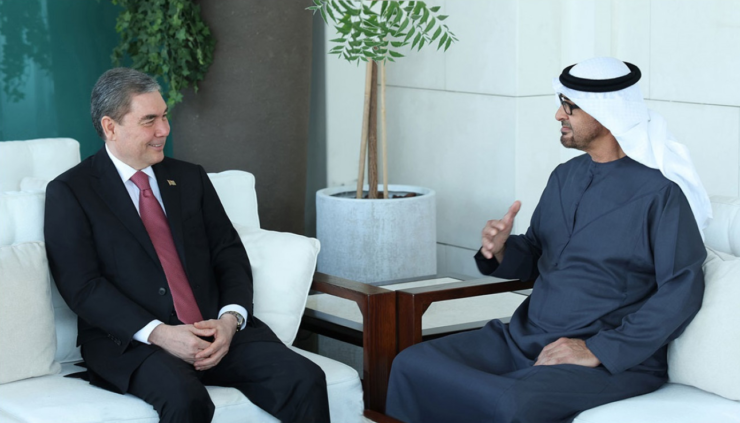
Chairman of the Halk Maslakhaty of Turkmenistan Gurbanguly Berdimuhamedov visited the United Arab Emirates from January 4-6, 2024. During his visit, the representative of the Republic held meetings with UAE President Sheikh Mohammed Bin Zayed Al Nahyan, as well as the representative of the UAE President for Affairs with Turkmenistan and Chairman of the Board of Directors of Dragon Oil.
According to state websites, Gurbanguly Berdimuhamedov focused on the prospects of cooperation between the UAE and Turkmenistan in developing oil and gas resources, transport corridors, and green energy. All of these areas are crucial for the economic development of the republic. Currently, the republic is striving to increase mineral extraction, diversify its export routes, and become the largest exporter of electricity in the Central Asian region. Energy shortages in the region make this goal even more important.
The visit is considered a continuation of the positive trend in the relationship between the two countries, which is expected to begin in 2023. Last year was notable for several important bilateral meetings and events.
In February 2023, Gurbanguly Berdimuhamedov made an official visit to the UAE.
On April 26-27, 2023, Turkmenistan held the International Forum to attract investments in its energy sector in the Emirates. The forum presented the country’s oil and gas fields, as well as promising gas and oil pipeline projects to major companies from Gulf countries.
On December 2, 2023, President Serdar Berdimuhamedov of Turkmenistan visited the Emirates to attend World Climate Action Summit (WCAS), in Abu Dhabi and hold bilateral meetings.
Additionally, it is worth noting that representatives from the UAE and Turkmenistan have attended several multilateral meetings, including the first-ever GCC-Central Asia Summit in July 2023. Furthermore, a GCC representative participated in the equally historic SPECA summit.
Despite the abundance of events, Turkmenistan remained on the periphery of the attention of Middle Eastern investors in Central Asia throughout the year. For example, recent major deals by Gulf representatives with Central Asian republics have included projects in Uzbekistan (a major agreement for the construction of solar and wind power plants by ACWA Power, as well as a green hydrogen plant) and Kazakhstan (an agreement with the same ACWA and the participation of the UAE’s Dragon Oil in the development of offshore fields), but not yet in Turkmenistan.
The Gulf monarchies’ increasing activity in Central Asia suggests expanding prospects for their cooperation with Turkmenistan. This state of affairs should not hinder investment in the Turkmen economy. Additionally, there are precedents in the region for UAE companies participating in projects similar to Turkmenistan’s promising initiatives. For example, a UAE company participated in developing oil and gas fields in the Caspian shelf of Kazakhstan, indicating potential for further involvement in the Turkmen sector of the Caspian Sea. The recent events demonstrate Ashgabat’s intensified efforts to develop offshore gas and oil fields. The participation of UAE companies such as Petrofac, Dragon Oil, Gulf Oil and Gas Fze in the development of fields in Turkmenistan is also worth mentioning. However, several new projects have also emerged in recent years that can attract investors from the UAE.
The current visit of Gurbanguly Berdimuhamedov was marked by Turkmenistan’s progress towards establishing a large-scale partnership with the UAE on new projects in promising sectors for the republic. On January 6, 2024, Turkmengaz and Abu Dhabi National Oil Company (ADNOC) signed a memorandum of understanding on cooperation in the development of the world’s largest onshore natural gas deposit, the Galkynysh field. We are talking about a promising partnership in the implementation of the third phase of the field’s development against the background of Turkmenistan’s prospects for increasing gas exports through the currently promoted TAPI gas pipeline project (to Pakistan and India), as well as the new line of the Central Asia-China gas pipeline, and still existing prospects for gas supplies to Europe. This initiative is significant for Turkmenistan’s economy, comparable to the development of the Caspian shelf or the creation of gas pipelines leading to the south or west. An important aspect of the agreement is that the parties have agreed to work together to reduce methane emissions from gas production in Turkmenistan, which is currently one of the obstacles to gas exports to the EU.
In order to continue the bilateral dialogue, Chairman of the Halk Maslakhaty of Turkmenistan Gurbanguly Berdimuhamedov extended an invitation to the UAE President to pay an official visit to Ashgabat. It is probable that the parties will not confine themselves to a single memorandum of understanding by the end of 2024. Naturally, the development of the partnership between the two countries will largely depend on Turkmenistan’s ability to maintain and strengthen its position as a major gas supplier to China, expand the geography of its exports, and secure new agreements for the purchase or transit of gas and oil.
Boris Kushkhov, Department of Korea and Mongolia, Institute of Oriental Studies of the Russian Academy of Sciences, exclusively for the online magazine “New Eastern Outlook”
